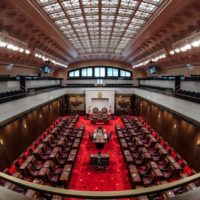
News
A year of milestones for the Senate
Senate milestones in 2017 include more influence for independent Senators on committees and key amendments to create better laws.
Canada’s renewed Senate marked significant milestones in 2017 on its path towards becoming a more independent and less partisan institution, including more influence for independent Senators on committees, key amendments to create better laws and underscoring its right to deal with unethical behaviour.
22 new laws
Over the past year, 22 pieces of government legislation have become law. The Senate played a significant role in improving several pieces of legislation, including:
- Bill S-3, which enshrines in law the removal of all gender-discrimination in the Indian Act;
- Bill C-6, which removes barriers to Canadian citizenship;
- Bill C-37, which gives health and law enforcement professionals significant new harm reduction
tools in the face of a growing opioid crisis; and - Bill C-7, which creates a better labour relations regime for the RCMP.
The recent adoption of Bill C-61, which enables participating Anishinabek Nation First Nations to govern and administer their own education system, implements some of the calls to action in the Truth and Reconciliation Commission’s report.
The Senate also adopted a plan to have a televised hearing in the new year on legislation that sets the framework for legalizing, regulating and restricting access to cannabis. The Senate will open its doors to three federal ministers and a parliamentary secretary for Committee of the Whole on February 6, as second reading of Bill C-45—the Cannabis Act—continues.
Legislation that targets drug- and alcohol- impaired driving also advanced to committee for review ahead of the winter break. Bill C-46 gives law enforcement the necessary resources to further deter and detect impaired driving, the leading criminal cause of death and injury in Canada.
In addition to its important work on legislation, the Senate also approved the appointment of nominees for the positions of the Commissioner of Official Languages, the Commissioner of Lobbying and the Senate Ethics Officer.
Historic changes
This fall, the Senate adopted a historic agreement that gives independent Senators, who make up the largest group in the Senate, leadership roles in the all-important committee system. The agreement was adopted after the expiration of a temporary order put in place last year to allow the growing number of Independent Senators membership, but not chair positions, on committees.
The new agreement gives Senators from all groups in the Senate a proportional number of chairs and seats on committees.
The agreement is particularly significant as the number of independent Senators grew to 45. Three new Senators were appointed this year following an arm’s length process that preserves their autonomy from party caucuses. Two more Senators left their political caucuses in 2017 to sit as independents.
As the year comes to a close, 46 per cent of all Senators are women, the highest proportion in Canada’s history.

Senate Liberal Lillian Dyck (left) and Government Representative in the Senate Peter Harder (right) welcome Manitoba’s newest Independent Senator, Mary Jane McCallum, to the Red Chamber on December 13, 2017. PHOTO: Greg Kolz
The Senate also made history when the Standing Committee on Ethics and Conflicts of Interest recommended the expulsion of Senator Don Meredith over his inappropriate sexual relationship with a teenage girl.
The committee detailed in its May report that the Senate does have the power and authority to expel a Senator—an unprecedented move. The recommendation came after the Senate Ethics Officer’s comprehensive March 9th report detailed how Meredith breached the Senate’s code of conduct.
Meredith resigned before the Senate could vote on the committee’s recommendation to expel him.
Organizing debate
In the spring, the Government Representative in the Senate published a discussion paper on how the Senate deliberates and makes decision on legislation.
Senator Peter Harder proposed the creation of a business committee in the Senate that would set a timetable for the deliberation of parliamentary business. The goal is for a Parliament that is less consumed by partisan rubber-stamping and more focused on substance of public policy.
In response, an inquiry calling attention to the Senator Harder’s proposal was put forward in the Senate.
Read the debates on the “Sober Second Thinking” proposal here:




















































